- Journey Into Dreams/What Do You Mean (Pye 7N.15676) 1964
- Now/This Year, Next Year (Pye 7N.15733) 1964
- At The Club/Distant Drums (Pye 7N.17013) 1965
- Lust For Life/My Baby Loves Them (Parlophone R 5511) 1966
- Little Sir Echo/Help Me Make It Through The Night (Decca F13227) 1971
- A Bad Boy/Rock And Roll Wedding (Phillips 6006414) 1974
- ALISTER JONS AND HIS MAGIC GUITAR (Denman Discs (EP) DD 101) 1977
The Wolves

WOLVERHAMPTON
Revised November, 2017
John Eades lead guitar
Willem "Wimp" Feder rhythm guitar
Robert "Bobby" Holt lead vocal
Darryl Smith bass guitar
John Taylor drums (left in 1965)
Clive Nicholls drums (joined in 1965)
Taking their name from the famous football (soccer) team, The Wolves held the unique distinction in 1964 of becoming the very first Wolverhampton pop group to be signed to a major international record label. Local music historian and BrumBeat contributor Brian Nicholls has written their story as follows:
"The biggest thing since The Searchers"
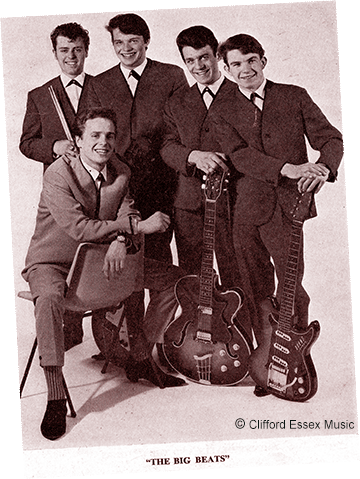
In their formative years, the group started out as "Gerry Sinclair and The SellaKats" with John Taylor (drums), John Eades (lead guitar), Wimp (real name Willem) Feder (rhythm guitar), Daryl Smith (bass) and, Frank Littleford (lead singer). All the usual influences such as skiffle and rock 'n' roll had left their mark. Prior to The SellaKats, Feder and Eades were with "The Stormers", Smith with "The Renegades" and Taylor with "The Coasters".
After the normal musical apprenticeship of performing at youth clubs, charity events and private parties plus the gradual acquisition of decent equipment, they morphed into "The Big Beats" in early 1963 whilst retaining their original lineup. Wolverhampton businessman Geoff Jacobs owned a fashion house in Salop Street town and also promoted local music venues so, why not have a dabble into artiste management? In January, 1964 he became manager of The Big Beats.
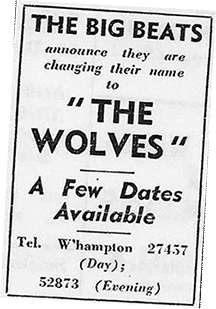
Specialist fretted instrument monthly 'BMG' (Banjo, Mandolin and Guitar) reported that... "Mr Jacobs has lived for the group over the past few months, backing his own hunch by taking what was an average group and badgered, pummelled, and finally moulded them into presentable material and dictating how they dressed and what guitars and amplifiers they used".
In early 1964, Geoff approached Wolverhampton Wanderers Football Club, successfully seeking permission to change the group's name from The Big Beats to "The Wolves" which considerably increased their local fan base. A clever PR move to be sure! On becoming The Wolves, the nucleus of group members remained but, with the sole exception of front-man Frank Littleford who left to join The Jurymen and was replaced by Bobby Holt after which, they turned fully pro.
In his book 'N Between Times, author Keith Farley reports The Wolves were playing at The Civic Hall in Wolverhampton on April 18, 1964 where Geoff had arranged for a representative from Pye Records to check out the suitability of the lads. After the concert was over, The Wolves and Geoff signed a five year recording contract with Pye's Alan Freeman who described the group as... "the biggest thing since The Searchers". They actually supported The Searchers at Wolverhampton Civic Hall at a later date.
"Journey Into Dreams"
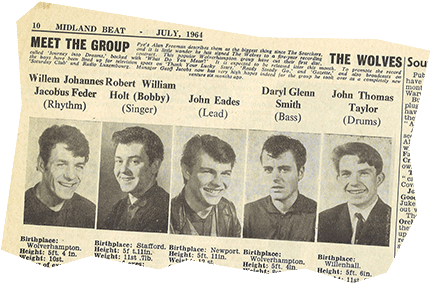
The Wolves became a popular attraction on the "Ma Regan" ballroom circuit - especially The Plaza at Old Hill. In July, the Midland Beat newspaper published an enthusiastic almost full-page "MEET THE GROUP" feature on The Wolves that included detailed bios of each band member. For example, Midland Beat wrote that Bobby Holt liked; "Chinese food, chips, lying in bed, a pint of bitter, and dislikes girls with heavy make-up". Such was the style of pop music journalism!
All of this popularity engendered by Geoff Jacobs was met with some disdain from other more seasoned Wolverhampton pop groups who felt that The Wolves had come from nowhere and leap-frogged over them in the success stakes.
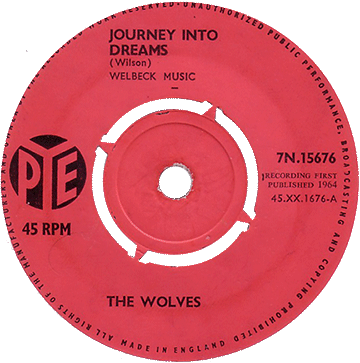
The Wolves' first single titled 'Journey Into Dreams' backed with 'What Do You Mean' (composed by guitarist John Eades) released in July 1964, enjoyed plentiful airplay on Saturday Club, Radio Caroline and Radio Luxembourg plus lots of stations across America. There followed peak-time TV appearances on influential shows 'Thank Your Lucky Stars', 'For Teenagers Only', 'Ready Steady Go' and 'Gazette'.
One music press review reported Bobby Holt's vocal performance on the recording as... "A quasi-operatic delivery by a rock tenor who also whistles his way through the introduction to the song" Actually, when I first heard their single I thought the intro was reminiscent of Alessandroni who whistled and strummed his guitar through the soundtrack of the 1964 spaghetti western, A Fistful of Dollars. Could this have been yet another Geoff Jacobs ploy?
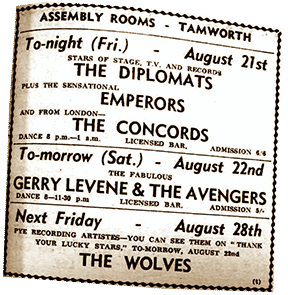
In truth, Journey Into Dreams sounded more like a 1959/60 American pop ballad which was musically out of step with the then current beat boom sweeping in from Liverpool's so called "Merseybeat". However, it was actually a well produced and performed recording. It didn't stop a music paper critic commenting... "The song lacks heavy rhythm guitars and a driving beat". In mitigation though, the B-side 'What Do You Mean' had both a driving beat and a pretty nifty guitar solo therefore, it should have been the A-side in my opinion.
The second Wolves Pye single 'Now/This Year, Next Year' released in November, 1964 was aired on BBC's popular Saturday show, Juke Box Jury whereupon panelist Lonnie Donegan stated that... "They sound like a million other groups". Back on home turf in Wolverhampton, Geoff Jacobs had organised for The Wolves to headline a concert at The Grand Theatre in December, 1964 called "The Midlands Group Gala".
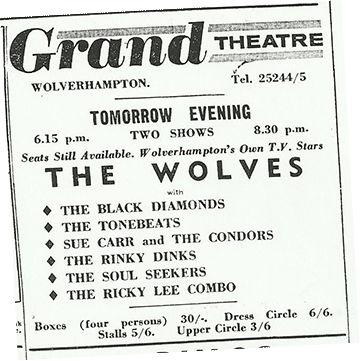
Despite good publicity, the show was not an entire success. The first house was only half-full but the second far better. In the first house the groups were plagued by petty difficulties. Lack of space on the stage, microphones not working, and troublesome stands resulting in The Soul Seekers singer skipping from mic to mic to find one working which meant he was not heard for half their first number.
"The miserably short rehearsal and set-up time allowed by the theatre" was cited as the reason, including a curtain that took ages to close at the end of the first house. The Wolves, however, went down well and good humour prevailed throughout the show. In 1965 there was a change in personnel when Clive Nicholls replaced John Taylor on the drum stool.
"Over the past year, the Wolves have played 344 days out of the 365"
The Wolves third single was a 1966 cover of The Drifters 'At The Club' backed with 'Distant Drums'. Again, another well-crafted single that any group would have been proud of. Geoff Jacobs reported that; "Over the past year, The Wolves have played 344 days out of the 365 comprising of, 138 clubs, 123 at a Weymouth Summer season, 77 pubs, 26 dance halls, 1 theatre, 6 military bases, 4 cabaret acts, 8 youth clubs, and the Lord Mayor's Ball in Birmingham".
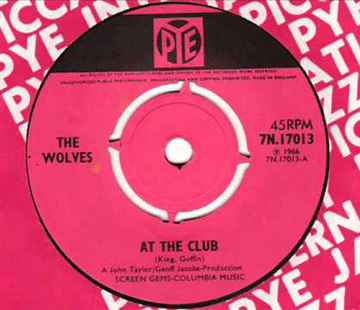
Also in 1966, The Wolves switched record labels from PYE to Parlophone with the October release of 'Lust For Life' backed with 'My Baby Loves Them' as their latest single. The A-side sounded a full year ahead of its time with "psychedelic-sounding" guitar and bass along with freaky electric organ. Should have been released during the "Summer of Love" where it would have been an inspirational smash hit. This was a great 45 reminiscent of the emerging San Francisco groups but sadly failed to make the UK charts.
Following a lack of chart success, The Wolves signed with Kennedy Street Agency based in Manchester and enjoyed lucrative cabaret work in the north of England variety clubs after which little was known of them locally. Although Geoff Jacobs produced their latest record along with drummer John Taylor, he too moved to pastures anew in 1968 as a radio presenter in America.

In 1967 lead guitarist John Eades changed his name to "Alister Jons" and became very busy as a solo act on the cabaret, theatre and the cruise ship circuit. He specialised in guitar instrumental music with a few vocals thrown in for good measure. He enjoyed a successful 1967 Christmas season at Corby Civic Theatre in a variety show with bill toppers and TV stars "Terry Hall and Lenny the Lion".
In 1971 Alister Jons signed with Decca who released 'Little Sir Echo/Help Me Make it Through The Night' and in 1974 on Phillips he recorded 'A Bad Boy/Rock And Roll Wedding Day'. In 1977 he released an EP (extended play) on the Denman label entitled "ALISTER JONS AND HIS MAGIC GUITAR". Alister was reported as saying that he would never ever dream of joining another group.
Monthly magazine BMG of October, 1964 had reported there were twenty seven thousand provincial pop groups across the UK. Making it or, breaking into the big time was a bit of a lottery (right place, right time) but, having a good manager like Geoff Jacobs certainly helps but, so does moving to London where resides all the movers and shakers. Even Brian Epstein had to move his operation to London eventually as did one of Wolverhampton's greatest exports, Slade.
The Wolves single 'Journey Into Dreams' turned up again as a track on a Castle Records compilation CD in 2004 called "Beat, Beat, Beat". The Wolves were extremely popular in their day and they enjoyed a small measure of success that most of us could only dream of.
I am grateful to Slade archivist Christopher Selby (https://www.facebook.com/Slade1966) for assistance and provision of some archive material.
Copyright © Brian Nicholls 2017
The Wolves 1960s Record Releases
Singles:
Alister Jons Record Releases
If you would like to contribute to this page, please e-mail john@brumbeat.net